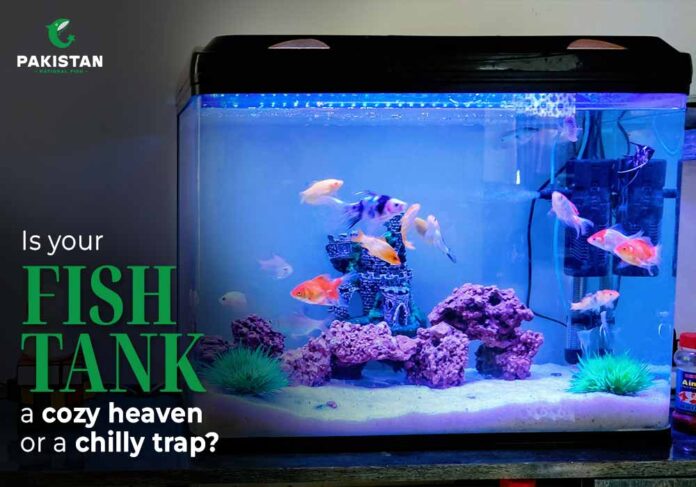Hey there, fish-keeping friends! If you’ve ever wondered, “Why is an aquarium heater essential for fish health?” you’re in the right place. Let’s dive into the warm, welcoming world of fish tank heaters and why they’re a must-have for keeping your aquatic buddies happy and healthy. Whether you’re a newbie with a single betta or a seasoned aquarist with a bustling tank, maintaining the right water temperature is like giving your fish a big, cozy hug. Without it, they could be stressed, sluggish, or worse.
So, grab a cup of coffee, and let’s explore why a heater for fish is non-negotiable, how to choose the best one, and some insider tips to keep your tank thriving.
Table of Contents
Why Do Fish Need a Heater in Their Tank?
Fish, especially tropical ones like bettas, are like us when it comes to comfort—they thrive in a stable, warm environment. In the wild, bettas swim in the warm, shallow waters of Southeast Asia, where temperatures hover between 75-82°F (24-28°C). Your home, unless you live in the tropics, probably doesn’t maintain that kind of consistent warmth. Room temperatures often dip to 68-72°F, which is too chilly for tropical fish. A fish tank heater steps in to keep the water just right, preventing stress, sluggishness, or even illness.
Here’s why an aquarium heater is a game-changer:
- Stable Temperature: Fish are sensitive to temperature swings. A heater keeps things steady, avoiding stress that can weaken their immune system.
- Boosts Metabolism: Warm water supports healthy digestion and energy levels, keeping your fish active and vibrant.
- Promotes Growth: Consistent warmth encourages natural behaviors like breeding and healthy fin development.
- Prevents Illness: Cold water can make fish prone to diseases like ich, while a heater creates a cozy, disease-resistant environment.
Without a heater, your fish might survive, but they won’t thrive. Imagine living in a house that’s always 10 degrees too cold—you’d be miserable, right? Your fish feel the same way.
Do Betta Fish Need a Heater?
You bet they do! The question “Do betta fish need a heater?” pops up a lot, especially since bettas are often sold in tiny bowls. But here’s the truth: bettas are tropical fish, and they need water between 76-81°F to stay healthy. A betta fish tank heater is crucial, especially in smaller tanks where temperature fluctuations can happen fast.
Here’s why bettas need that extra warmth:
- Tropical Origins: Bettas come from warm, slow-moving waters in Thailand. Cold water slows their metabolism, dulls their colors, and stresses them out.
- Small Tank Challenges: Many bettas live in 2.5-5 gallon tanks, which lose heat quickly. A heater ensures stability.
- Health and Longevity: Studies suggest that a heated tank can extend a betta’s lifespan by reducing stress and boosting immunity.
- Behavior Boost: Warm water keeps bettas active, encouraging them to swim, flare their fins, and even build bubble nests.
So, do bettas need a heater? Absolutely, unless your room stays consistently above 78°F (which is rare). A small aquarium heater is your betta’s best friend.
How Does an Aquarium Heater Work?
An aquarium water heater is like a tiny thermostat for your tank. It’s designed to heat the water to a set temperature and maintain it, turning on and off as needed. Most heaters are submersible, meaning they go fully underwater, and they use a heating element controlled by a thermostat to keep things steady.
Here’s the magic behind how fish tank heaters work:
- Thermostat Control: A built-in thermostat monitors the water temperature and activates the heating element when it drops below the set point.
- Even Heat Distribution: Placed near a filter’s water flow, the heater spreads warmth evenly throughout the tank.
- Safety Features: Many modern heaters have auto shut-off to prevent overheating if the water gets too warm or the heater is exposed to air.
- Wattage Matters: The heater’s power (measured in watts) determines how effectively it can heat your tank’s water volume.
Think of it as a cozy blanket that wraps your tank in warmth, keeping your fish snug and stress-free.
What Size Heater Does Your Aquarium Need?
Choosing the right heater for fish depends on your tank’s size and the room’s ambient temperature. A heater that’s too weak won’t keep up, while one that’s too powerful can overheat your tank. The general rule is 2.5-5 watts per gallon of water, but let’s break it down.
Here’s a handy table to guide you:
Aquarium Capacity | Wattage Requirements | Best For |
1-3 gallons | 7.5-25 watts | Nano tanks, betta setups |
5 gallons | 25-50 watts | Small betta or community tanks |
10 gallons | 50-100 watts | Medium tropical tanks |
20 gallons | 100-200 watts | Larger community tanks (e.g., electric 20 gallon water heater) |
50+ gallons | 200-300 watts or more | Large aquariums with multiple fish |
Tips for Sizing:
- Room Temperature: If your room is colder (e.g., below 70°F), lean toward the higher end of the wattage range.
- Multiple Heaters: For tanks over 20 gallons, consider two smaller heaters for even heat distribution.
- Small Tanks: A small aquarium heater (e.g., 10-25 watts) is ideal for nano tanks to avoid overheating.
- Check the Label: Always confirm the heater’s gallon rating on the packaging to match your tank.
Getting the right size ensures your tank stays toasty without turning cauldron.
What Types of Fish Tank Heaters Are Available?
Not all fish tank heaters are created equal. Depending on your setup, you might need a specific type to suit your tank’s size and style. Here’s a rundown of the main types:
- Submersible Heaters: Fully underwater, these are the most common and efficient, ideal for most tanks. They often come with suction cups for easy placement.
- Partially Submersible Heaters: Less common, these have a portion above the waterline. They’re cheaper but less efficient for even heating.
- Mini/Nano Heaters: Perfect for small aquarium heaters in 1-5 gallon tanks, like betta setups. They’re compact but need careful monitoring to avoid overheating.
- Substrate Heaters: Sit under the gravel, often used in planted tanks. They’re less common for bettas due to uneven heating.
- In-Line Heaters: Connected to external filters, these are great for larger tanks but rely on filter function.
- Preset Heaters: Fixed at a specific temperature (e.g., 78°F). They’re affordable but less flexible.
- Adjustable Heaters: Allow you to set a specific temperature, offering more control for sensitive fish like bettas.
For most betta owners, a fully submersible, adjustable betta fish tank heater is the way to go for reliability and ease.
How Do You Pick the Best Fish Tank Heater?
With so many options, finding the best fish tank heater can feel like navigating a coral reef maze. Here’s how to make a smart choice:
- Check Wattage: Match the heater’s wattage to your tank size (see the table above).
- Look for Thermostats: Adjustable thermostats give you control, while preset ones are simpler but less precise.
- Safety Features: Opt for heaters with auto shut-off to prevent overheating or damage if the water level drops.
- Durability: Choose models made of shatterproof or high-quality glass to withstand accidental bumps.
- Brand Reputation: Stick to trusted brands like Fluval, Eheim, or Aqueon for reliability.
- Size and Design: For small tanks, a compact heater blends in better and saves space.
- User Reviews: Check for best-rated aquarium heaters with consistent positive feedback to avoid duds.
Pro tip: Always pair your heater with a separate thermometer to double-check the water temperature. Heaters can malfunction, and you don’t want your fish paying the price.
Are Small Aquarium Heaters Safe for Tiny Tanks?
Small aquarium heaters are a lifesaver for nano tanks (1-5 gallons), but they come with a catch. Because small tanks have less water, they’re prone to faster temperature swings, making heater choice critical. Here’s what you need to know:
- Choose Low Wattage: A 7.5-25 watt heater is ideal for tanks under 5 gallons to prevent overheating.
- Adjustable is Best: Preset heaters can sometimes run too hot for tiny tanks, so go for adjustable models.
- Monitor Closely: Use a thermometer to check the temperature daily, as small tanks can overheat quickly.
- Avoid Cheap Models: No-name brands often lack safety features and can malfunction, risking your fish’s safety.
A small, reliable heater like the Aqueon Mini or Fluval Marina is perfect for a betta’s cozy home. Just keep an eye on it!
What Makes the Most Efficient Aquarium Heater?
The most efficient aquarium heater saves energy, maintains steady temperatures, and lasts for years. Here’s what to look for:
- Smart Thermostats: Heaters with precise, computer-calibrated thermostats (like the Fluval M) minimize energy waste.
- Auto Shut-Off: Stops heating when the water reaches the set temperature, reducing power use.
- Durable Materials: High-quality glass or PPC plastic ensures longevity, so you’re not replacing it every year.
- External Controls: Heaters with dials outside the tank (e.g., Freesea 50W) make adjustments easy without disturbing the tank.
- Even Heat Distribution: Submersible heaters placed near filter outflows spread heat efficiently.
Efficiency isn’t just about power—it’s about reliability and keeping your tank stable with minimal fuss.
How Can You Ensure Safety with an Aquarium Water Heater?
Safety is huge when you’re mixing electricity and water. A faulty heater can overheat, crack, or even shock you or your fish. Here’s how to keep things safe:
- Buy Quality: Stick to reputable brands with safety certifications (e.g., UL-listed). Avoid no-name heaters with sketchy reviews.
- Check for Auto Shut-Off: This feature prevents overheating if the heater is exposed to air or malfunctions.
- Use a Thermometer: Always have a separate thermometer to verify the heater’s accuracy.
- Proper Placement: Place the heater horizontally near the filter outflow for even heat and to prevent glass cracking on gravel.
- Unplug During Maintenance: Never touch a heater while it’s plugged in, especially during water changes, to avoid shocks.
- Inspect Regularly: Check for cracks, frayed cords, or signs of wear, and replace if needed.
A little caution goes a long way in keeping your fish tank and heater a safe haven.
What Are the Best-Rated Aquarium Heaters on the Market?
Based on user reviews and expert recommendations, here are some of the best-rated aquarium heaters for betta and tropical tanks:
- Fluval E Electronic Heater: Offers a wide temperature range (68-93°F), an LED display, and a compact design. Perfect for 5-20 gallon tanks.
- Eheim Jager Thermostat Heater: Reliable and durable, with precise temperature control for tanks up to 10 gallons.
- Aqueon Pro 50W Heater: Fully submersible, shatterproof, and great for 5-10 gallon tanks.
- Freesea 50W Mini Heater: Adjustable, with an external dial and auto shut-off, ideal for small betta tanks.
- Hydor Theo 25W Heater: Compact and reliable for 5-gallon tanks, with consistent performance.
These heaters consistently get high marks for reliability, safety, and ease of use. Check user reviews on sites like Amazon for real-world feedback.
How Do You Maintain Your Fish Tank and Heater?
A well-maintained fish tank and heater setup keeps your fish healthy and your equipment lasting longer. Here’s how to do it:
- Check Temperature Daily: Use a glass or stick-on thermometer to ensure the water stays between 76-81°F for bettas.
- Clean the Heater: Unplug and gently wipe the heater with a soft cloth during water changes to remove algae or salt buildup.
- Monitor Water Quality: Regular water changes and a good filter keep ammonia and nitrates low, supporting fish health.
- Inspect Equipment: Check the heater’s cord, suction cups, and housing for wear every month.
- Avoid Direct Sunlight: Keep the tank away from windows to prevent temperature spikes.
- Use a Lid: A tank lid reduces evaporation and helps maintain stable temperatures.
Regular TLC keeps your tank a happy home for your fish and your heater in top shape.
Can You Skip a Heater in Warm Climates?
Living in a warm climate? You might wonder if you can skip the heater. The answer depends on consistency. If your room stays above 78°F day and night, year-round, you might get away without a heater. But here’s why it’s still a good idea:
- Nighttime Drops: Even in warm climates, temperatures can dip at night, stressing your fish.
- Seasonal Changes: Winter or rainy seasons can lower room temperatures, affecting the tank.
- Stability is Key: Heaters maintain a steady temperature, which is critical for avoiding temperature shock.
- Small Tanks: Smaller tanks (like betta setups) fluctuate faster, making a heater essential even in warm areas.
If you’re in a tropical paradise with stable warmth, you might skip the heater, but for most of us, it’s a small investment for big peace of mind.
Final Thoughts: Keep Your Fish Toasty and Thriving
Your fish deserve a warm, stable home, and an aquarium heater is the key to making that happen. From bettas to other tropical fish, the right heater keeps them active, healthy, and vibrant.
Whether you’re picking a small aquarium heater for a 2.5-gallon betta tank or an electric 20 gallon water heater for a community setup, focus on quality, safety, and the right wattage. Pair it with a thermometer, keep up with maintenance, and your fish will thank you with dazzling colors and playful swims.
So, what’s stopping you? Dive in, pick the best fish tank heater, and turn your aquarium into a cozy paradise!


